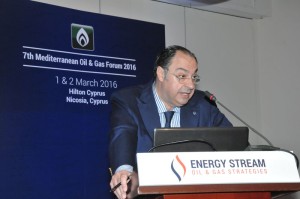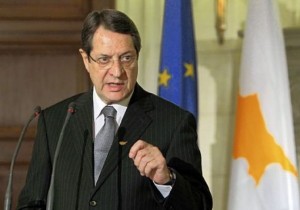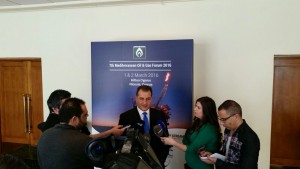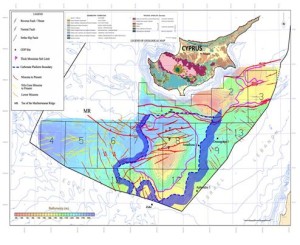NICOSIA, Cyprus: Oil and gas figure to unlock historic gains for Cyprus that go far beyond economics and even its own borders, a senior industry veteran told a two-day energy conference in Nicosia as it wrapped up last week.
“Cyprus is the region’s natural energy hub, meaning that every step it takes toward realizing that ambition also improves its neighbors’ chances of building their own oil and gas sectors,” said Roudi Baroudi, CEO of Qatar-based Energy and Environment Holding (EEH), an independent consultancy.
For good measure, he told the audience at the 7th Mediterranean Oil & Gas Forum, the rapidly emerging energy industry also “promises a huge added incentive” for leaders of the country’s Greek Cypriot and Turkish Cypriot communities to continue “rebuilding momentum for reunification.”
Cyprus has been divided since 1974, when Turkish troops occupied the northern third of the island in response to a Greek-sponsored coup. Now a new United Nations-backed peace process has received a welcome boost from the warming relationship between President Nicos Anastasiades, who heads the internationally recognized Republic of Cyprus (ROC), and Turkish Cypriot leader Mustafa Akinci. The two even made a joint appearance at last month’s World Economic Forum in Davos, Switzerland.
EEH’s Baroudi, who has worked in the industry for more than 30 years, also applauded Cyprus for setting positive examples for other countries in the region.
“It is gratifying when public officials recognize a historic opportunity before their compatriots and actively participate in making it happen,” he told a panel audience, and “Cyprus’ dual progress on both the peace process and the oil and gas sector should instill hope in all of its neighbors.”
Indeed, the ROC was heavily represented at the forum, with keynote addresses delivered by each of Foreign Minister Ioannis Kasoulides, Energy, Commerce, Industry, and Tourism Minister Yiorgos Lakkotrypis, and President Anastasiades himself. Numerous other officials were also on hand for various sessions, as were high-level participants from foreign governments and major international corporations.
Baroudi also urged the authorities in his own country, Lebanon, to get serious about protecting its own interests, starting with efforts to define its Exclusive Economic Zone (EEZ). This process could be complicated, he warned, by the fact that Israel – with which Lebanon has no diplomatic relations – is one of three countries in the region, along with Syria and Turkey, that have neither signed nor ratified the UN Convention on the Law of the Sea (UNCLOS). To make sure Lebanon’s doesn’t miss out on its fair share of any revenues, he argued, talks to set the maritime boundary with Cyprus should be revived, and both sides should request “the good offices of the United States to help define the southern tripoint where their EEZs come together with Israel’s.”
If and when Beirut reaches out to Nicosia, he predicted, it will find a willing partner.
“Cyprus has clearly demonstrated its commitment to cooperation as the route to a harmonious regional energy industry that would impart enormous economic, social, and even security benefits to all participating countries and their populations,” Baroudi told his audience. “In fact we all owe Cyprus our gratitude. Lebanon’s leaders need to show the same initiative, the same imagination, and the same concern for future generations.”






